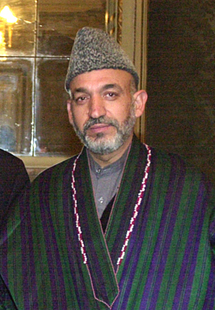Karzai closer to winning tainted Afghan vote
Sardar Ahmad
KABUL, Sardar Ahmad- Afghan President Hamid Karzai on Saturday inched closer to the prospect of outright victory in elections marred by allegations of massive fraud and international concerns about their credibility.
Officials have now announced results from 35 percent of polling stations in the second ever direct presidential vote in a country dogged by a Taliban insurgency, eight years after the US-led invasion.
British Prime Minister Gordon Brown, on a lightning visit to the troubled south, pledged to speed up training Afghan security forces in order to battle the insurgency and eventually draw down international troops.

Out of 2.03 million valid votes counted, Karzai won 940,558 and former foreign minister Abdullah Abdullah 638,924, Daud Ali Najafi, chief electoral officer at the Independent Election Commission (IEC), told a news conference.
The figures gave Karzai 46.3 percent of votes announced and Abdullah 31.4 percent, widening the incumbent's previous lead of around nine percent and apparently increasing his prospects of avoiding a second round.
The results are being released in stages in a process that the IEC has said will lead up to the announcement of preliminary results on September 3, and the final tally on September 17.
The next tranche is due to be released on Monday, the commission said.
The time it is taking to release results has seen claims of fraud escalate.
More than 2,000 such claims have been received by the Electoral Complaints Commission (ECC), heightening concerns that the legitimacy of the final results and any Karzai victory will be compromised.
Abdullah, who has accused his opponent of rigging the vote, said he would not accept a compromised outcome and would examine all legal avenues to counter what he called "state-engineered fraud".
In an interview with a British newspaper, he said if that proved unsuccessful, he would refuse to recognise the election.
"If it worked, all well. If it didn't, we will not accept the legitimacy of the process and then this regime will be illegitimate."
Fraud allegations have become a focal point for Afghanistan's Western allies, with France announcing that envoys from Britain, France, Germany and the United States will meet in Paris on Wednesday to discuss the elections.
The White House, following on from revelations that its regional envoy, Richard Holbrooke, had a testy meeting with Karzai immediately after the August 20 vote, condemned any acts of fraud that might emerge.
Reacting to reports that Holbrooke wants the vote to go to a second round for the sake of credibility, the IEC said the result is an Afghan issue.
"It is not up to Mr Holbrooke to decide the first or the second round. This decision is up to the people of Afghanistan who have voted and the IEC is counting these votes," Najafi said.
The United States and its Western allies initially welcomed the elections as a success, but fraud concerns and early results that point to turnout of 30-35 percent have raised concerns about the legitimacy of the outcome.
Together NATO and the United States have more than 100,000 troops in Afghanistan in support of the Afghan government fighting a resurgent Taliban.
On his visit to Afghanistan, the British prime minister said new equipment was being brought into the field, such as more armoured vehicles, which combined with an increase in Afghan forces would help improve security.
"I think we could get another 50,000 Afghan army personnel trained over the next year," Brown told the BBC from Helmand, where the majority of Britain's approximately 9,000 troops in Afghanistan are based.
"Stepping that up means that the Afghans take more responsibility for their own affairs. They're backed up by partnering and mentoring done by the British forces."
The mounting British military death toll in Afghanistan has led to an increase in public concern over the length of the mission and whether it is adequately equipped.
With record numbers of troops deployed and insurgent attacks at an all-time high, 2009 is the deadliest year for foreign troops since the 2001 invasion.
--------------------------------------------------------------------------------------------------------------------------------